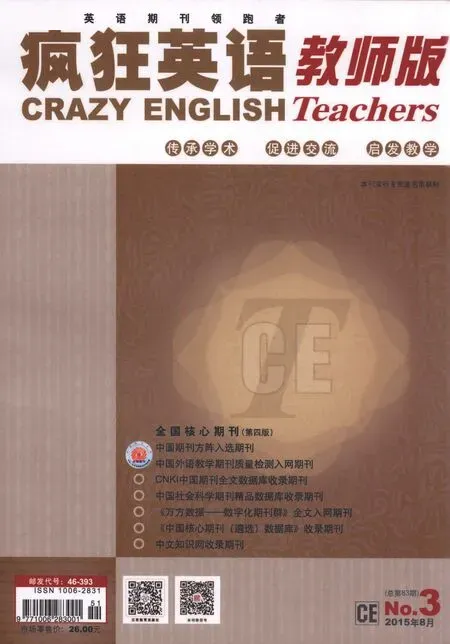Collective Oriented Culture and Its Negative Impact upon Oral English Teaching
Abstract: As one of the most distinguished features of Chinese Culture, collective oriented culture is the deep structure of Chinese cultural psychology which has shaped Chinese character and influenced their behavior. As a result of it, Chinese students suffer this negative effect from collective orientated culture when acquiring English, especially in oral English acquisition. TEFL teachers should be aware of cultural psychology and try their best to minimize its negative effect instead of neglecting or even enlarging it during oral English teaching.
Key words: collective oriented culture; negative effect; oral English teaching
[文獻標識碼]A
[文章編號]1006-2831(2015)08-0076-3 doi:10.3969/j.issn.1006-2831.2015.03.020
收稿日期:2015-6-20;修改稿:2015-7-13
*基金項目:陜西省教育科學“十二五”規(guī)劃2012年課題“基于順應(yīng)論的高職公共英語教學改革理論和實踐研究”(SGHI2589)。
N owadays, oral English teachers are apt to complain about students’ poor co-operation during teaching process, which excessively keeps teachers from accomplishing their teaching targets. In fact, when it comes to such an issue, oral English teachers should be highly aware of the fact that Chinese culture has been dominated by Collectivism for a long time, which functions as a negative element upon oral English teaching. Therefore, it is essential to explore this very value dimension—Collectivism and its negative impart upon oral English teaching in China, a typically collective oriented culture.
1. Collective and collectivism oriented culture
Collectivism, as a typical value dimension of Chinese, is characterized by a rigid social framework that distinguishes between in-groups and out-groups. People count on their in-group (relatives, clan, organization) to look after them, and in exchange for that they believe they owe absolutely loyalty to the group.
Collective oriented culture denotes that members of the culture are predominated by Collectivism. Consequently, it is positive that collective oriented culture embodies Collectivism in various aspects. On the contrary, the latter influences and shapes the former. Compared with Individualism which indicates the doctrine, spelled out in detail by the seventeenth century English philosopher Locke, that each individual is unique, special, completely different from all other individual, collectivism embodies that “we’ consciousness prevails: cooperation rather competition is encouraged; group goals take precedence overpeople goals and so on. Collective behaviors like so many aspects of culture have deep historical roots. Looked at the message of Collectivism in the words from “Confucius’: “If one wants to establish himself, he should help others to establish themselves at first.’’
In brief, Chinese people live in such a collective oriented culture which has penetrated every field of the social life as well as people’s personal life and has shaped people’s traits.
2. The negative impact of collective oriented culture upon oral English teaching
For the most parts, oral English teaching is a process of direct communication between teachers and students. Someone even argues that it is a sort of student-oriented activity. As a result, to a certain degree, people attach great importance to students’ performance during oral English teaching process.
Nonetheless, Chinese students live in the collective oriented culture which has shaped both their traits and behaviors. According to research, people reach a conclusion that some ill traits upon direct communication, such as saving face, preferring indirect communication, avoid competence and so on have been regarded as the negative consequence of collective oriented culture. It is such rooted traits that attach negative impact to oral English teaching. Saving face usually connected with self-esteem will result in giving up chances to speak in oral English class due to the fact that he or she isn’t competent. Then, the best way not to lose face is to keep silence and listen to others. Preferring indirect communication during oral English class actually leads students to fail to perform English conversations. What’s worse, avoiding competence used to be looked upon as the Chinese virtue—modesty, which prevents students from competing to adopt English to express themselves. Hence, some poor performances in oral English class should be owed to the students’ rooted traits, to be extract, Collectivism not students themselves.
On the other hand, it should not be ignored that collective oriented culture also makes a great impact upon English teachers. As for oral English teaching process, it is well known that teachers play a vital role. Hence, one of teachers’ responsibilities is to minimize the negative effect of Collectivism on either side. On the contrary, some teachers, even themselves, cannot escape from the restriction of Collectivism. For example, at the very beginning of the course, they prefer to dominate the whole oral English process by their perfect and fluent English than lead or encourage students to face this demanding course by establishing a less anxious language situation. As a consequence, students, especially those who are incompetent at oral English, not only are prone to admire teachers’ marvelous performance in oral English class but also are frightened into keeping silence. Since those students lack self-confidence to speak English, owing to save face, some of them will even shrug off opportunities to express themselves in oral English class. Therefore, teachers will have no choice but to occupy more time to speak in order to carry out their teaching targets or to break the ice. Nevertheless, less chances students are given, poorer their oral English is. As the result of the fact that they are given much slimmer chances, more incompetence in students’ oral English will follow. Such a terrible cycle will be bound to bring about some severe result for oral English teaching.
Therefore, teachers will bear this point in their minds that people in collective oriented

